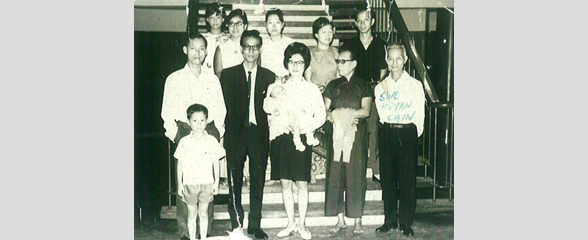 | Gee Fung (Peter) Chin and Yep Pyu (Patricia) Chin sit down with MOCA to discuss their family’s history and the story of their immigration from Burma to the United States. Peter and Patricia left Burma in 1970 when it was under military rule and decided to immigrate to the United States for more freedoms and economic opportunities. The two had met at Emmanuel Baptist Church in Burma, where they regularly attended Sunday school and youth fellowship. A year after their marriage, they found out that they were accepted as immigrants to the United States and landed in San Francisco with their first-born baby daughter in tow. After arriving only three days, they received a call from an uncle, who convinced them to move to New York. Once in New York, they initially stayed with Peter’s brother-in-law in Harlem but ultimately settled in Borough Park, Brooklyn. The couple briefly reflect on memories of what both neighborhoods were like at that time, and how life slowly became better and better as Peter landed a job and found success as an accountant. Patricia shares how her initial experience of America was colored by difficult first years of motherhood due to having to care for three babies closely spaced together, but she grew to really love living in America. The Chins describe their identity as very much Chinese American because they were raised Chinese and consider themselves as typical Chinese people who respect their parents and celebrate traditional holidays, but are also proudly American. Both take pride and thank God for the close-knit extended family they were able to build. Peter and Patricia each sponsored their parents to live with them in the United States, and even now, they see their own adult children regularly as well. Each bring up stories that they want their daughters to hear, including of Peter’s long lost sister, who was given up as a baby for adoption, and Patricia’s widowed mother, who courageously moved the young family to Burma and worked hard to raise Patricia and her older brother on her own. Peter notes that he earned an MBA and the children were all able to receive advanced degrees and achieve a good life in this country. Because of how blessed they are, they firmly believe that they made the right decision to come to America and want future generations in their family to know that. | 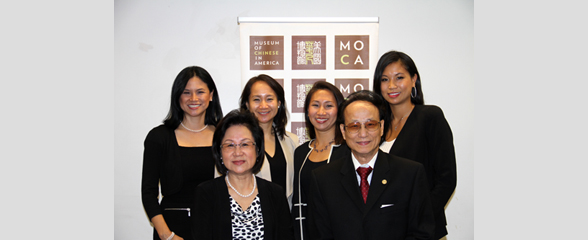 | The four sisters Grace Chin Chan, Judy Chin Wong, Anna Chin Tze, and Jennifer Chin Dussich sit down with MOCA to discuss their family history. They begin by describing growing up in Brooklyn and the communities and activities that they participated in there. They recount family stories from vacations and being rebellious teenagers. The sisters take turns discussing how grateful they are for their parents’ sacrifices, but also how they feel so grateful to have been raised with their parents’ values and how they cherish their parents’ legacy. The Chin sisters still have dinner with their parents and families every week and share other lessons from their childhood. | 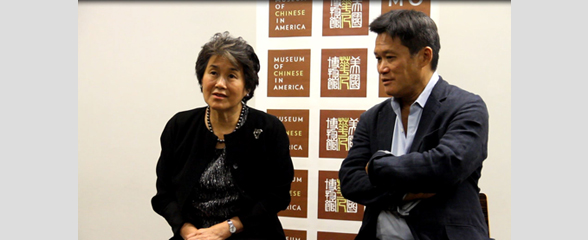 | Sandy and Doug Lee sit down with MOCA to discuss the history of their family, as found through archival and family research. They bring up the curio shop that their family kept and finding pictures from this business through a cousin. They discuss the involvement of their father in the U.S. Army and his position as translator for American diplomats who met with Mao and his party. They discuss how their Uncle funded one of the first Chinese-American film companies in the U.S., called Great Wall Films, to challenge American representations of Chinese people in film. They go back to discussing the store on 31 Pell Street, and discuss the beginning and then the history of the store. Their other uncle and their father had insurance and travel businesses in this building as well which still exist today. The businesses in this building grew and changed to adapt to the needs of the growing Chinatown community in San Francisco before the earthquake of 1906. They discuss the impact of the Chinese Exclusion Act on their family, with their relatives having to take long routes to and from China to avoid deportation. The Chinese Exclusion Act was also very isolating for the family, as it prevented them from seeing their other family members back in China. Since their grandmother and grandfather lived in such a dangerous neighborhood at the turn of the century, their grandmother did not go into the street by herself and instead spoke to other women by yelling from fire escape to fire escape. A Church took in their grandmother and taught her American customs and helped with childcare. During the Depression, the family relocated back to Hong Kong with their grandfather staying in Chinatown to run the business. Their father was educated in the U.S. and in Shanghai, which made him valuable as a translator since he knew four dialects of Chinese. Sandy and Doug discuss growing up in Flushing and later Great Neck, Long Island, and their ability to assimilate into American culture. They discuss more family history and then their family’s involvement with MOCA. | 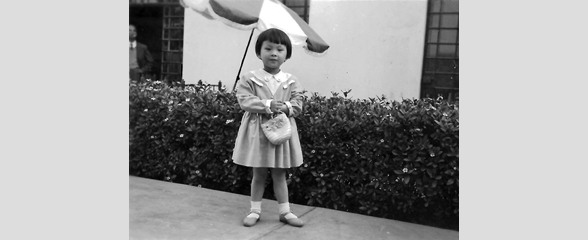 | The Journey Wall is a custom art installation created for MOCAs lobby by renowned artist/designer Maya Lin. The wall is composed of bronze tiles through which Chinese Americans can permanently honor and remember their family roots. Each tile bears the name of an individual or family, their ancestral home, and current place of residence in America. The complete wall will highlight the expansiveness of the Chinese American Diaspora and the diversity of immigration stories from across the country - from artists to businessmen. The interviews in this collection are the stories of the Chinese American families that are part of the Journey Wall installation. | 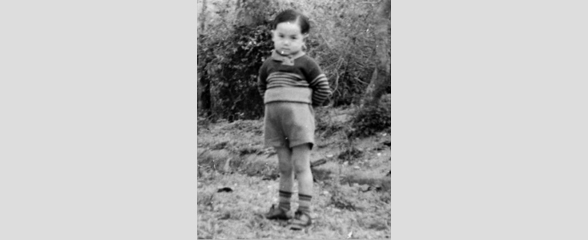 | Victor Kan discusses his philosophy and the history of his family with MOCA. He discusses his education at the University of Chicago and his experience growing up Chinese in America with only a small understanding of English. He discusses this experience in depth, and growing up learning from his classmates at age 13 how to speak English. His classmates encouraged him to join Boy Scouts and go to school dances with them, and he felt very supported by this American community. Victor went on to study Computer Science at UChicago. He discusses his childhood vacationing in Jong Son, China and explains that he bought his Journey Wall tile to give back to the community, but also to show his grandchildren and great grandchildren where they came from. He is not sad that his grandchildren may not look exactly like him; instead he believes that his children have found love and he is very happy for them. He discusses his philosophy of life for all immigrants and shares the anecdote of how he met his wife, Lucy. | 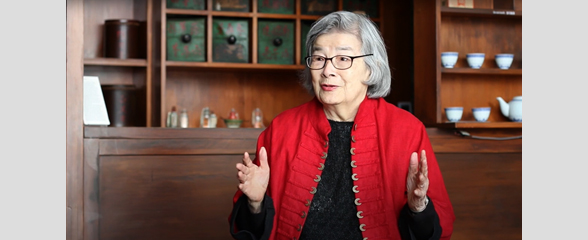 | Helen Lew Lang (1926-20017) founded the Crane House in Louisville, Kentucky, an internationally recognized center for learning about Chinese and Asian culture. She also established an Asian Studies Program at the University of Louisville. During the interview, Helen, at age of 88, talks about the immigration history of her family, when and how her parents came to America, her siblings and what influences they had on her as the youngest child in the family. She also talks about her life after meeting her husband, how she and her husband started the Crane House for Chinese families, then invited other Asian families, and how non-Asians became involved on the board to run it as a non-profit. She discusses her education and childrearing, including being involved in university groups and the PTA as well as raising children who were proud of their heritage. Helen supports the mission of MOCA as well as other museums and cultural institutions. Her family collection is housed at the Filson Historical Society in Louisville. This interview was the first Journey Wall donor interview MOCA has done. | 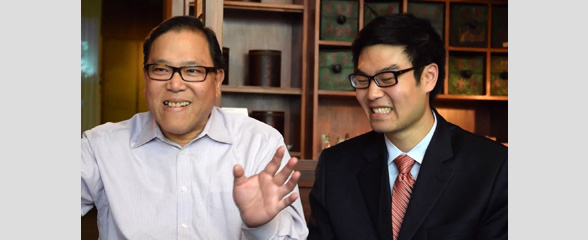 | Both Chester and Michael are extremely active in the Chinatown community. Michael heads the nonprofit group Apex and is a community leader in Chinatown. Chester has also worked with many nonprofits and believes it is important for people to share their gifts and help others. He views giving as a habit formed slowly over time that can have a large impact on various organizations. Michael attributes his inspiration in nonprofit work to witnessing his parents work in the community and his own experience on the Committee of 100. Chester advises Chinese Americans to remain grounded in the values they brought with them when they immigrated. He believes that staying true to their values will allow immigrants to succeed in a society that may not immediately accept them. Michael also hopes that the community will not be afraid to ask for help and will embrace other cultures and people to gain new information and become more prepared to succeed. | 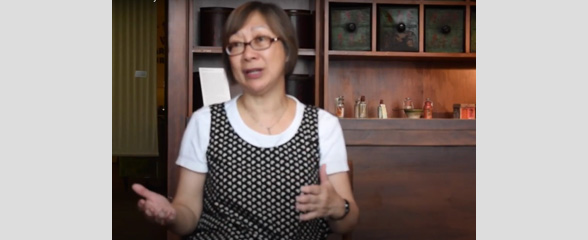 | Fay Chew Matsuda is the current program director at Hamilton-Madison House City Hall Senior Center. She is also an Asian American woman, a mother, a community member, an activist, and a feminist. Since 1989 she has served in the New York Chinatown History Project. She later became involved with the Museum of Chinese in America for a total of two ten-year terms. She shares many stories and ideas about Chinatown and how it has evolved. Fay also shares about her early childhood in Lower East Side, her school years at Hunter High School and Barnard College, and her career serving the community. This interview was conducted on July 9, 2015, by Nancy Yao Maasbach. | 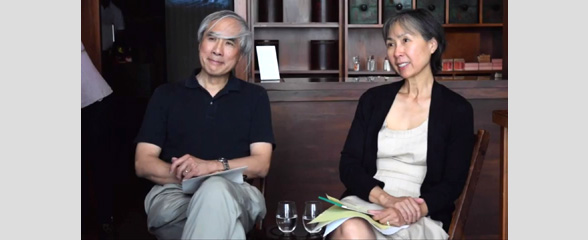 | Ms. Brenda Grosbard and Mr. Roger Yee are grandchildren of Reverend Yeung Kai Cheung, the second pastor of the first Chinese Presbyterian Church in Chinatown, New York City. In this interview, Ms. Grosbard and Mr. Yee provide a detailed description of their family tumultuous history and their grandfather journeys from Vancouver B.C., to Shanghai, before ending up in Chinatown, New York City, where he became a spiritual and cultural leader of the Chinese community in New York. They talk about their grandfather cultural struggles as a reverend of a Western religion, and his ultimate ability to gracefully incorporate Chinese philosophy and thinking with his Christian teachings. His eminence profoundly inspired and influenced Ms. Grosbard and Mr. Yee childhood and their own cultural experiences growing up Asian American in Long Island, New York. These stories of Brenda Grosbard and Roger Yee provide a moving glimpse into the grand figure that was Reverend Yeung Kai Cheung. | 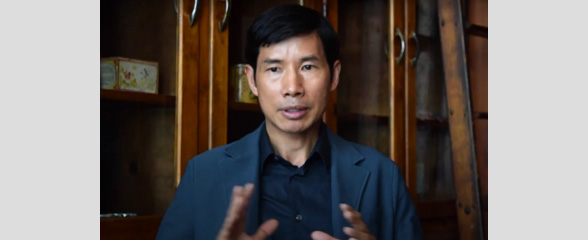 | Dr. Fred Hu is a Chinese economist who obtained his PhD in Economics from Harvard University and now runs Primavera Capital Group, his own capital investment firm. Today, he speaks to us about his childhood in the 1970s. He also discusses his education right after the reopening of the higher education system and studying abroad at Harvard University in the 1980s. He talks about his time working at various economic institutions around the world, expressing his overarching mission to strengthen U.S.-China relations. |









